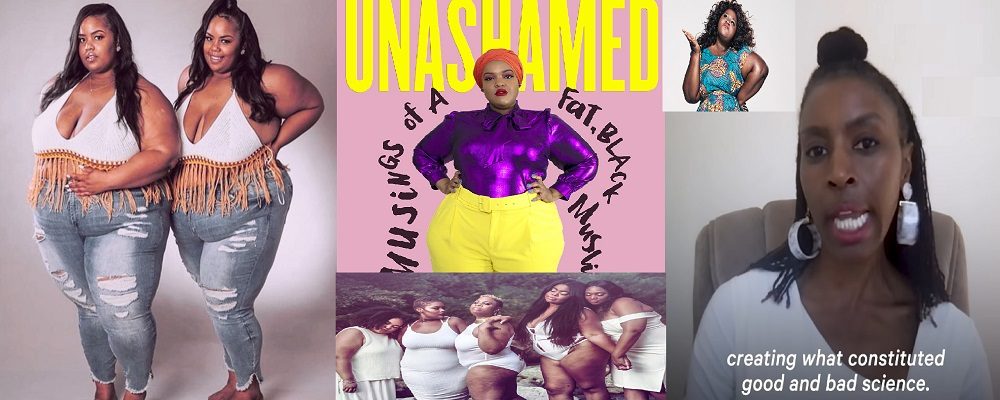
This Expert Explains How Not Liking Fat Women Is Rooted In Racism & White Supremacy! (Live Broadcast)
by Tj Sotomayor April 2, 2021 0 commentsHit The Link!
By: Tommy “Tj” Sotomayor
(SOUNDBITE OF MUSIC)
MADDIE SOFIA, HOST:
You’re listening to SHORT WAVE from NPR.
As a teen, Sabrina Strings loved getting to hang out with her grandma, even when her grandma was obsessing over one of her soap operas.
SABRINA STRINGS: I remember, one time, she called me into the living room, and she’s like, Sabrina, look at Victoria. Victoria’s a character on “Young And The Restless.” (Laughter) And she says, Victoria is killing herself to be thin; why are white women dying to be thin?
SOFIA: Fast-forward to 2003. Adult Sabrina was working at an HIV medication adherence clinic in San Francisco, where she witnessed real-life examples of women sacrificing their health to be thin.
STRINGS: And I had spoken to a couple of women, both HIV-positive, who refused to take their HIV medications for fear of gaining weight. And that blew my mind. And it immediately took me back to conversations I’d been having with my grandmother. Like, oh, my gosh, she was onto something so important. You know, when she was talking about it, she saw it as largely a white phenomenon. But the women I interviewed that day were both women of color.
(SOUNDBITE OF MUSIC)
SOFIA: Why were these women dying to be thin? And did race have anything to do with it?
(SOUNDBITE OF MUSIC)
SOFIA: Sabrina went on to become a sociologist at the University of California, Irvine and wrote a whole book investigating these questions.
STRINGS: If you are like me, you might have assumed that there was some moment in between Marilyn Monroe and Twiggy…
(LAUGHTER)
STRINGS: …In which – right? – suddenly that – whoa, we suddenly became fat-phobic in those three years.
SOFIA: But Sabrina started digging, looking at 19th-century magazines like Harper’s Bazaar, and what she found was troubling; articles warning American women – well, middle-class and upper-class white women – they needed to watch what they eat.
STRINGS: And they were unapologetic in stating that this was the proper form for Anglo-Saxon Protestant women. And so it was important that women ate as little as was necessary in order to show their Christian nature and also their racial superiority.
(SOUNDBITE OF MUSIC)
SOFIA: Today on the show, we go all the way back to the transatlantic slave trade to understand the racial origins of fat phobia and how Black people are still dealing with the consequences today. I’m Maddie Sofia, and this is SHORT WAVE, the daily science podcast from NPR.
So, Sabrina, let’s get into what you discovered about the history of fat phobia a little bit. You did a ton of research, and you started the story several centuries back, in Europe. It’s definitely in the ethos that, like, Renaissance women, you know, were full-figured, and that was absolutely a thing that was valued. And then there was a big shift. Explain what was going on back then.
STRINGS: So it turns out that the growth of the slave trade, especially by the 18th century, led to new articulations…
SOFIA: Yeah.
STRINGS: …Of what types of appearance we could expect of people by different races and also what types of behaviors, such that by the middle of the 18th century, a lot of French philosophers in particular were arguing that…
SOFIA: Yeah.
STRINGS: …You know what? When we’re in the colonies, we’re noticing that Africans are sensuous. They love sex, and they love food. And for this reason, they tend to be too fat. Europeans, we have rational self-control. This is what makes us the premier race of the world. So in terms of body size, we should be slender, and we should watch what we eat.
SOFIA: So OK, Sabrina, are you telling me that when the slave trade started and Europeans saw that African women were essentially curvy, much like European women at the time, at that point they decided that being fat, being thicker, wasn’t ideal anymore, and then they built a system of oppression around this idea of needing to be thin to prove racial superiority? Is that it? Am I close?
STRINGS: It’s not quite as intentional as that. Effectively, what they determined was that, you know, we wanted to be able to have a mechanism for ensuring that we could recognize who was slave and who was free, right? And it was easy in the beginning of the slave trade; it was simply skin color. But as you might imagine…
SOFIA: Right.
STRINGS: …After 200 years of living in close proximity, skin color really no longer works as a mechanism, right? Because now we have all of these people who are…
SOFIA: Yeah.
STRINGS: We would consider them today to be biracial. And so what they did was they decided to articulate new aspects of racial identity.
SOFIA: Right.
STRINGS: And so eating and body size became two of the characteristics that were being used to suggest that these are people who do not deserve freedom.
SOFIA: The transatlantic slave trade eventually ended, but Sabrina argues that we are still absolutely living with these racist attitudes about body size today. And in her book, she also traces how these anti-fat attitudes worked their way into modern medicine for somewhat arbitrary reasons. For example, take BMI, or Body Mass Index – that equation actually wasn’t intended to be used to measure individual fatness. But, of course, doctors did and still do today.
Can you explain the problem with using BMI as a measure for obesity, you know, especially when it comes to Black women, who I know have been told that they have the highest rates of obesity, according to that measurement, to BMI?
STRINGS: Yes. So BMI is a measure of the ratio of a person’s weight to their height. And what this does not account for is bone density, muscularity, any other type of genetic influences in your weight…
SOFIA: Right.
STRINGS: …Or cultural, environmental influences in your weight. And so what ends up happening, as many people have pointed out, is that you might have two people with the same BMI but vastly different life experiences and body composition outside of the simple reality of their weight-to-height ratio, right? And the problem of applying this to Black women in particular is that African American populations – as studies have shown for literal decades, since at least the ’80s – tend to be healthier at heavier weights than white populations. And so that already is an indication that, cross-racially, this is not a very useful tool. Not to mention the fact that even within race, there are going to be vastly different experiences of an individual body between, like…
SOFIA: Right.
STRINGS: …Their weight and their health profile.
SOFIA: So, Sabrina, this message from the medical establishment that excess weight is the biggest, you know, reason for Black women’s health problems or a very central element of it, why do you see it as so damaging, you know, for Black women?
STRINGS: Ultimately, the main advice that people are given when they are so-called obese is to lose weight, and there are so many problems with this. We have been telling people to lose weight for decades. What ends up happening is that they either don’t lose the weight, or they sometimes do lose the weight and then frequently gain it back. So first off, it could be more harmful to tell people to lose weight in the long run. And then in addition to that, there are the psychological effects of telling people that their bodies are wrong…
SOFIA: Right.
STRINGS: …That their bodies are inherently unhealthy. This type of fat stigma also leads to worse health outcomes.
SOFIA: Right, right, right. So let’s talk about this in the context of COVID-19. I’m thinking about the recent New York Times op-ed you wrote about how COVID-19 is disproportionately impacting people of color, specifically Black people, and how you took issue with obesity gaining traction as, you know, like, a leading explanation for that disparity. So talk to me a little bit about that.
STRINGS: This piece was actually motivated by something that I felt was very troubling, which was I had been seeing so many reports suggesting that the disparities in COVID outcomes between white populations and Black populations – they would say things like, well, you know, there’s already the preexisting factor of obesity and, you know – somehow that was one of the first things to come up.
And I thought, there is very little evidence that disparities in, quote-unquote, “obesity” are what’s contributing to these negative health outcomes. But there’s plenty of evidence to suggest that COVID fatalities or maybe even serious complications with COVID-19 are being influenced by people’s environments. Are they essential workers? Do they have access to enough soap and water…
SOFIA: Right.
STRINGS: …Or hand sanitizer. And so, of course, we might imagine that the ability to socially distance, to shelter in place, to have access to healthy foods under quarantine, all of this is very much being structured by a person’s social location. And Black people tend to live in communities without access to a lot of different healthy and life-giving resources.
SOFIA: Yeah. And, Sabrina, you know, I’ll tell you that, as a person that reads a lot of the literature on COVID, as a person who’s a microbiologist, I am seeing a lot of papers coming out that are associating with the – obesity with health outcomes of COVID. But, you know, those links tend to be correlative, right?
STRINGS: Right.
SOFIA: But even if we were to find out that there’s absolutely a causal link between COVID and obesity – which I think you’re arguing there isn’t one, especially right now at least – the rates of obesity in white and Black populations aren’t actually that different.
STRINGS: That’s right.
SOFIA: Right? Like, it wouldn’t necessarily be the thing that made it. So can you tell me a little bit about those rates versus, you know, the actual percentage of disparities we’re seeing?
STRINGS: So according to the CDC, the rates of obesity between African American and white populations are 42.2% for white populations and 49.7% for Black populations or about that. And so we’re looking at, effectively, a 7-percentage-point disparity between white and Black populations in terms of rates of obesity. However, when we’re looking at serious complications with COVID-19, what we’re seeing is that Black people are dying at rates of 2.4 to seven times that of white populations. How that 7-percentage-point differential is leading to 2.4 to seven times the disparity in serious complications and in death, no one’s really being able to explain that.
And so this is the problem with the kinds of correlative studies, which is that they lead people to believe that somehow obesity is one of the drivers when, in fact, it could simply be a confounder in these studies.
SOFIA: I see.
STRINGS: But we’re so used to studying obesity and treating these correlations as if they are evidence of a causal link that people are frequently not being very critical when they’re seeing studies that show these relationships.
SOFIA: You know, Sabrina, you’ve obviously spent years by now working to understand this issue and to educate folks about it. I’m wondering, you know, like, why this? Why have you specifically taken this on?
STRINGS: One of the reasons why I’ve continued to do it is I’ve seen what a difference it’s made to people’s lives. I mean, I’ve had so many people reach out and tell me that they felt for the longest time like something was wrong but no one was talking about it or that I’ve spoken to their personal experience. I couldn’t have imagined when I started doing this work that it could have possibly had the impact that it’s had. You know, I’m standing on the shoulders of giants, people who have been feminist scholars, medical scholars, journalists who have been doing this work at least since the 1970s.
But we’re at a moment right now where there’s a critical mass of people who are aware that the discourse surrounding fatness that we’ve long accepted really is baseless. And we can think about a new way of allowing people to have a positive relationship to their bodies and to cultivate health within themself and their communities that does not rely on fat stigma.
SOFIA: OK, Sabrina, I appreciate you. Thank you so, so, so much for coming on the show and sharing your life and your work with us. I really appreciate it.
STRINGS: Thank you so much. It’s been a pleasure.
(SOUNDBITE OF MUSIC)
SOFIA: Sabrina Strings – her book is called “Fearing The Black Body: The Racial Origins Of Fat Phobia.” This episode was produced by Yowei Shaw and edited by Deborah George. Rebecca Ramirez checked the facts. I’m Maddie Sofia, and you’ve been listening to SHORT WAVE from NPR.






No Comments so far
Jump into a conversationNo Comments Yet!
You can be the one to start a conversation.Only registered users can comment.